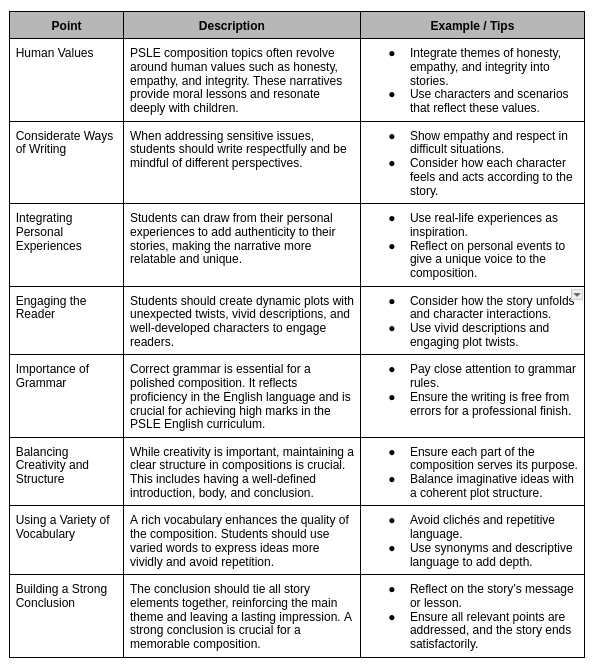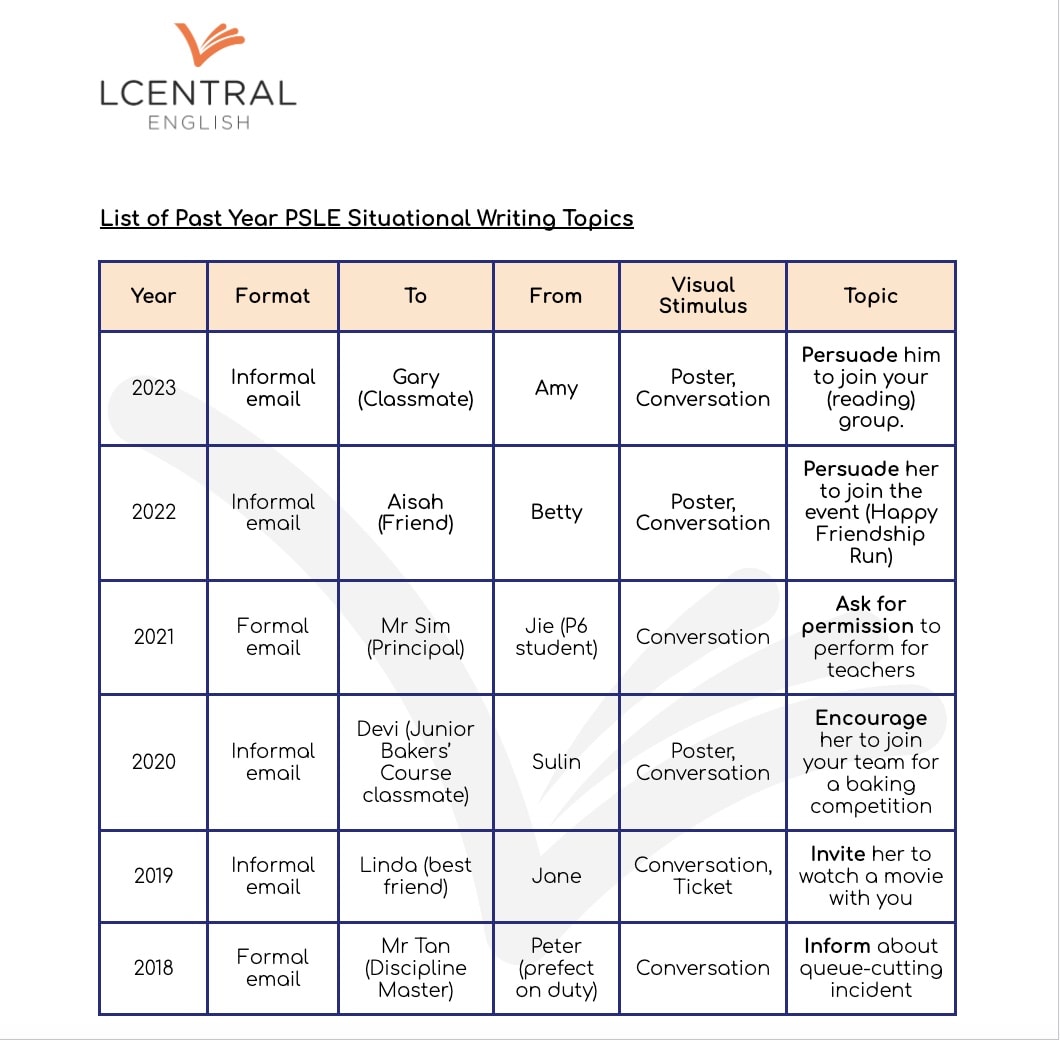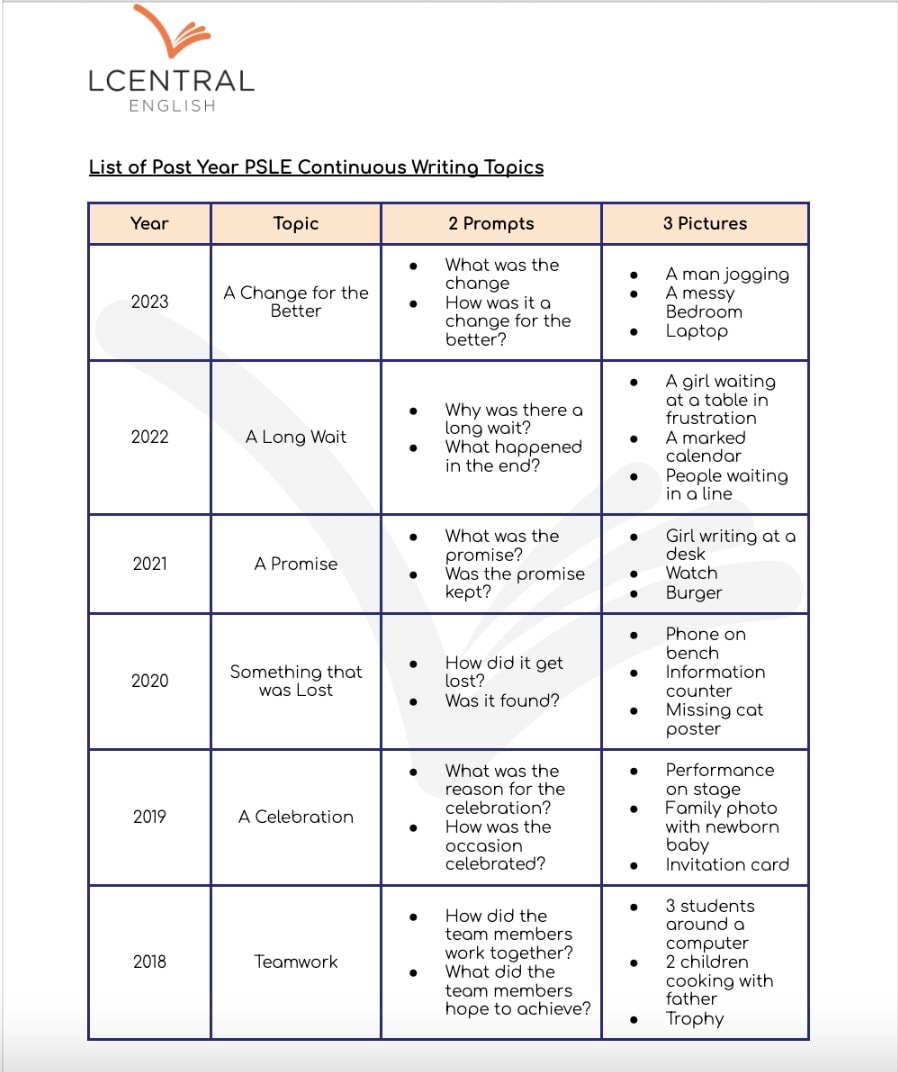
PSLE Composition Topics: Exam Themes
Continuous Writing, often called “compo”, is a significant component of the PSLE English examination in Singapore. It demands creativity, clarity, and a solid grasp of the English language. This article explores PSLE composition topics, offering insights into common themes, types of topics, and strategies for successful composition writing. Understanding these aspects is crucial for primary school students preparing for this essential part of their academic journey.
Most Common PSLE Composition Themes
PSLE composition topics often revolve around themes that resonate with primary school students. These themes are designed to tap into young learners’ everyday experiences and human values, making it easier for them to relate and express their thoughts. Some of the most prevalent themes include:
- Friendship: Stories about best friends, team members’ work, and loyalty.
- Family: Narratives focusing on familial bonds, conflicts, and celebrations.
- Courage: Tales of bravery, overcoming fears, and taking bold actions.
- Kindness: Acts of compassion and considerate ways of dealing with others.
- Perseverance: Stories about determination, hard work, and resilience.
These themes reflect human values and encourage students to think deeply and write expressively.
Types of Topics / Titles
The PSLE composition exam features composition titles that can be broadly categorised into direct and indirect titles.
Direct Topics
Direct topics are straightforward and explicitly state the theme. They require the student to focus directly on the given topic without needing much interpretation. Examples include:
- “The Day I Lost My Way” (boy holding a map, girl writing a diary)
- “A Special Gift” (ribbon-tied box, girl sitting on a bench)
- “The Metal Gate” (boy jogging past a metal gate)
Indirect Titles
Indirect titles, on the other hand, are more abstract and require the student to interpret and creatively connect the title with their story. Examples include:
- “The Long Wait” (audience watching a performance, lady with a mobile phone)
- “Promise” (boy and girl shaking hands, person with a special gift)
- “The Unexpected Event” (two boys, people carrying balloons)
Understanding the nature of the title is crucial as it guides the direction and focus of the composition.
How to Plan Your Composition
Planning is a vital step in crafting a compelling composition. Here are some simple tips to help you plan effectively:
Brainstorming
Start by brainstorming ideas related to the title. Consider the following points:
- What human values can be incorporated?
- Who are the main characters (boy, girl, child)?
- What is the central conflict or main event?
- How will the story begin, develop, and conclude?
Structuring the Story
Ensure your composition has a clear structure:
- Introduction: Set the scene and introduce the main characters.
- Rising Action: Build up to the main conflict or event.
- Climax: Present the most exciting or intense part of the story.
- Falling Action: Show the consequences or outcomes of the climax.
- Conclusion: Wrap up the story, reflecting on the main theme and human values.
Incorporating Pictures Provided
The PSLE composition exam often includes three pictures students must incorporate into their story. Use these pictures to enhance your narrative, ensuring they are integral to the plot.
The PSLE composition exam includes three pictures. Students must incorporate one or more of these pictures into their story. Students should use these pictures to enhance their narrative, ensuring they are integral to the plot.
Tips for Tackling PSLE Composition Topics
Here are some simple tips to excel in the PSLE English composition:
Understand the Theme
Whether the title is direct or indirect, understanding the underlying theme is crucial. Reflect on how the theme relates to everyday experiences and human values.
Use Vivid Descriptions
Engage your readers with vivid descriptions and sensory details. Describe the setting, characters, and actions in a way that makes the story come alive.
Develop Relatable Characters
Create characters that your readers can relate to. Whether it’s a boy holding a balloon, a girl writing a letter, or two boys playing, ensure they are believable and relatable.
Show, Don’t Tell
Instead of telling the reader what’s happening, show it through actions and dialogue. For example, instead of saying, “The boy was scared,” show his fear through his trembling hands and quick pace.
Plan for Conflict
Conflict is the heart of any good story. Consider the conflict in your composition – it could be a problem to solve, a challenge to overcome, or an unexpected event.
Practise Regularly
Practise writing compositions on different topics. The more you write, the better you’ll organise and express your thoughts clearly.
Other Examples of PSLE Composition Topics and Titles
Students are usually given a topic, two prompts, and three images. Here are some example PSLE composition topics to help you get started:
- The Lost Puppy (girl writing about finding a lost dog, boy jogging with a puppy)
- A Promise Kept (boy holding a special gift, girl sitting with a smile)
- The Unexpected Visitor (audience watching a surprise guest, a lady with a mobile phone)
- The Brave Act (team members hope to win a game, people carrying flags)
These examples reflect direct and indirect topics, encouraging students to think creatively and plan their compositions effectively.
Exploring Other Relevant Points in PSLE Composition Topics
Incorporating these relevant points into their compositions will help students excel in their PSLE English exams. By understanding and applying these strategies, students can create compelling and well-crafted compositions that stand out. Students and parents can refer to educational blogs and resources provided by schools and class teachers for further tips and insights.
Sample Composition Titles and Themes
Below are tables summarising past year PSLE topics: PSLE composition topics and themes:
Frequently Asked Questions
Are there any resources for practising PSLE compositions?
Many websites and textbooks offer past PSLE composition topics with sample essays and planning guides. Searching online for “PSLE composition practice” will give you various options. Educational blogs often share useful tips and sample compositions.
Is it important to memorise specific vocabulary for compositions?
While a strong vocabulary is helpful, focusing on understanding the theme and using it effectively is more important. You can always rephrase or use synonyms if you can’t recall a specific word. Adapting and using context-appropriate language reflects well on your ability to write an English composition effectively, a crucial skill tested in the PSLE English exam.
How can I improve my planning skills for PSLE compositions?
Mind mapping or creating a simple outline before writing can be very helpful. This will allow you to organise your thoughts, identify key points, and ensure your composition flows smoothly. Planning helps structure the story and ensures all relevant points are covered. Teachers often recommend practising this in class to develop a strong habit.
What are some common mistakes to avoid in PSLE compositions?
- Going off-topic: Make sure your writing stays focused on the given theme.
- Poor grammar and mechanics: Proofread carefully to avoid spelling, punctuation, and sentence structure errors.
- Lack of details: Use vivid descriptions and examples to bring your story to life.
- Clichés and overused phrases: Opt for original and creative language.
Avoiding these mistakes will significantly enhance the quality of your English composition.
Should I write in a narrative or descriptive style?
The PSLE composition format usually allows for both. You can choose a narrative approach to tell a story or a descriptive approach to paint a picture with words.
How important are the pictures provided in the exam?
The pictures act as prompts to guide your writing. You are required to use at least one of them to create your story or description, but ensure your writing stays connected to the theme. The images are crucial as they provide context and can spark ideas for your narrative or descriptive passage.
What is the ideal length for a PSLE composition?
The minimum requirement is usually around 150 words. However, aiming for 200-250 words allows for more elaboration and better chances of showcasing your writing skills.
How can I feel more confident about my PSLE composition writing?
Practise regularly using different themes and writing styles. Ask your teacher or a tutor to review your work and provide feedback. Remember, the more you practise, the more comfortable and confident you’ll become.
Conclusion
The PSLE English composition is crucial to the PSLE English examination, testing students’ ability to think creatively, plan effectively, and express their thoughts clearly. Students can excel in their compositions by understanding common themes, becoming familiar with a variety of topics, and using strategic planning.
Remember to incorporate vivid descriptions, develop relatable characters, and plan for a central conflict. Regular practice and a deep understanding of human values will further enhance your writing skills, ensuring you are well-prepared for the PSLE composition exam.
Check out our guides on PSLE Oral Topics dan PSLE Composition Topics here at LCentral!
Also visit our PSLE Exam Mastery Series program.



